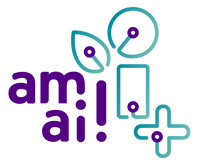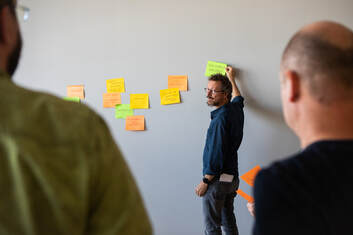Phase 3: project call
The ideas and concepts for AI solutions serve as basis for the project call.
Which teams can make these ideas of citizens become true? After deliberation of experts, citizens get the last word in which projects get financial support.
The ideas and concepts for AI solutions serve as basis for the project call.
Which teams can make these ideas of citizens become true? After deliberation of experts, citizens get the last word in which projects get financial support.
About the project call
Amai! is not only about information, but also about participation and impact. The ideas shared by citizens are not collected and brought together without commitment. A project call ensures that the AI ideas and concepts with the highest chance of making a societal impact are actually transformed from theory to reality.
In the various editions of amai!, projects could receive support of up to 75,000 euros (first two editions) or 125,000 euros (third edition). The submitting consortia had to consist of a collaboration between AI companies, non-profit organizations, (local) governments, research institutions, or citizen movements (at least 2 different types of organizations).
In this collaboration, an idea for AI must be developed, and citizens should also be involved in this development through a citizen science approach. By involving citizens in the project and reporting about it as amai!, the projects also serve as sources of information on AI. Thus, the projects create societal impact by addressing a need in the areas of health, mobility, work, or climate and environment, AND by giving citizens a better understanding of how AI systems work, how they come about, and actively contributing to the development of the solution.
The complete project call of the third edition of amai!, with all details and conditions, can be checked here.
After announcing the project call, we organized information and matchmaking moments where interested parties could ask questions and find project partners.
In the various editions of amai!, projects could receive support of up to 75,000 euros (first two editions) or 125,000 euros (third edition). The submitting consortia had to consist of a collaboration between AI companies, non-profit organizations, (local) governments, research institutions, or citizen movements (at least 2 different types of organizations).
In this collaboration, an idea for AI must be developed, and citizens should also be involved in this development through a citizen science approach. By involving citizens in the project and reporting about it as amai!, the projects also serve as sources of information on AI. Thus, the projects create societal impact by addressing a need in the areas of health, mobility, work, or climate and environment, AND by giving citizens a better understanding of how AI systems work, how they come about, and actively contributing to the development of the solution.
The complete project call of the third edition of amai!, with all details and conditions, can be checked here.
After announcing the project call, we organized information and matchmaking moments where interested parties could ask questions and find project partners.
The selection of the projects was always done in 2 steps:
1. Expert jury
In the first phase, an interdisciplinary expert jury evaluates the quality of the project proposals on several dimensions (quality of the AI solution, budget plan, project plan, citizen science component, and data plan). This results in a ranking of projects. For each amai! domain, the 3 highest-scoring projects were retained.
2A. Public vote
In the second phase, citizens have the final say. This is done through a widely publicized public vote where citizens can vote for their favourite projects. This vote goes hand in hand with a broad media campaign. To reduce partiality, citizens had to cast their vote on several projects.
2B. Citizen jury
From the third edition of amai!, in addition to a public vote, a citizen jury was also organized. 15 citizens deliberated the projects based on their societal impact. The citizen jury created a ranking of the projects, the highest scoring project that had not yet been selected by the public vote, was also chosen to receive funding. More information on the process of the citizen jury can be read in this report (in Dutch).
1. Expert jury
In the first phase, an interdisciplinary expert jury evaluates the quality of the project proposals on several dimensions (quality of the AI solution, budget plan, project plan, citizen science component, and data plan). This results in a ranking of projects. For each amai! domain, the 3 highest-scoring projects were retained.
2A. Public vote
In the second phase, citizens have the final say. This is done through a widely publicized public vote where citizens can vote for their favourite projects. This vote goes hand in hand with a broad media campaign. To reduce partiality, citizens had to cast their vote on several projects.
2B. Citizen jury
From the third edition of amai!, in addition to a public vote, a citizen jury was also organized. 15 citizens deliberated the projects based on their societal impact. The citizen jury created a ranking of the projects, the highest scoring project that had not yet been selected by the public vote, was also chosen to receive funding. More information on the process of the citizen jury can be read in this report (in Dutch).
Variations and refinements throughout the editions of amai!.
Based on our experiences, we refined the process every edition:
- Amai!2 – A fifth theme
We added a fifth theme, specifically tailored to inclusion: ‘Everyone along’. However, we found that this theme already got covered through the project proposals in the four original domains (climate, work, mobility, health) and left out this fifth pillar in amai!3. - Amai!2 – Voting across themes
Because, after the first step, the expert jury didn't always retain enough high-quality projects to maintain 3 projects per domain, citizens had to indicate their favourite projects across themes. - Amai!2 – longer duration for funded projects
De duration of one year proved too short for project initiators to create a meaningful proposal. This is why, in the second edition, we decided to extend this duration to 24 months. - Amai!3 – Citizen jury
In the third edition of the amai! initiative, in addition to a public vote, a citizen panel is organized. This panel is thoroughly informed about the projects eligible for a subsidy over two days, giving them the opportunity to make a more informed choice (see above) - Amai!3 – Higher grant
The grant of €75.000 proved too low for project initiators to create a meaningful proposal. We therefore made the choice to fund less projects, three instead of five, for an amount of €125.000 - Amai!3 – Support for more projects
However, thanks to the great success of the project call, the Flemish government offered additional funding for 2 more projects. Eventually, in amai!3 five projects were funded for €125.000 per project.


